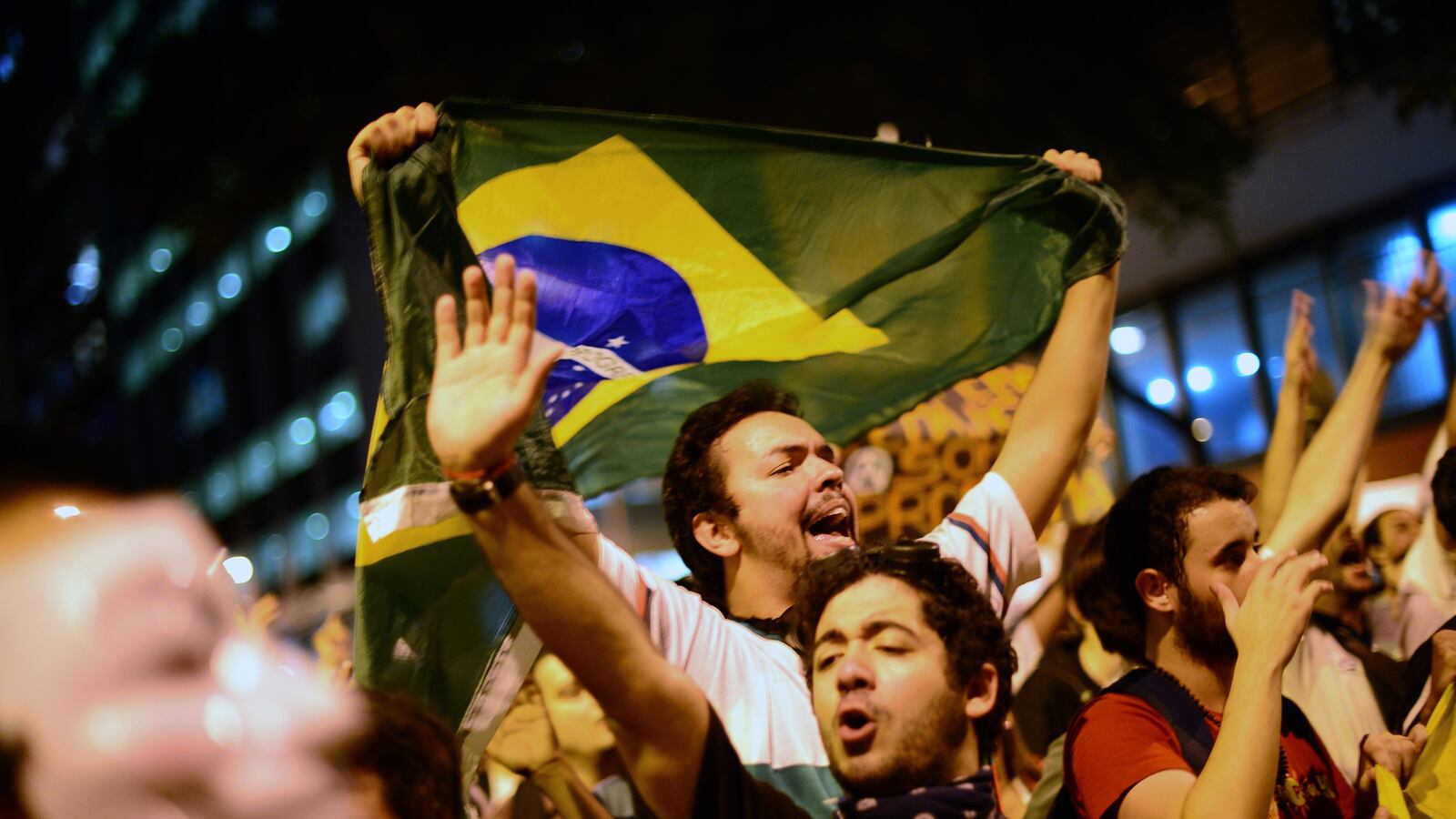Brazilians held their breath on Monday night as tens of thousands of demonstrators, placards and roses in hand, once again poured into the streets of the country's largest cities while phalanxes of black-clad riot police stood at the ready.

Though social media and the local press reported scattered clashes, there was little of the mayhem and violence of recent days when similar protests turned two of Latin America's megacities into battlefields.
The days of rage have caught observers of this emerging Latin American powerhouse by surprise and rattled a government already suffering from decaying popularity.
Bringing to mind the ongoing protests in Turkey, what began last week as an improvised demonstration against a small hike in bus and subway fares flared into an outright revolt, sweeping a dozen Brazilian cities and throwing a harsh light on the shortcomings of a nation anxious to claim the stage in world affairs.
Triggering the revolt was an innocuous-seeming fare increase of about nine cents for public transportation in São Paulo. But the outrage touched a nerve in this sprawling metropolis of 18 million, where 7 million people depend on a precarious network of buses and subways, and where commuting to and from work can be a four-hour ordeal. "The cars of 20 percent of the population occupy 80 percent of the streets," read one protest banner yesterday.
Demanding "no cost" public transit for all, the youth-driven Free Ticket Movement struck a national chord and quickly escalated into a national revolt with a laundry list of grievances, including badly managed government health care, political corruption, failing public schools, and cost overruns on showy public works for the 2014 World Cup and 2016 Olympics that Brazil will host.
Noted media commentator Arnaldo Jabor initially described the demonstrations as "useless anarchism" but then, on Monday, publicly retracted his criticism, praising the protestors as the vanguard of "political creativity."
Though the protests were launched peacefully last week, small bands of provocateurs resorted to vandalism, trashing storefronts and throwing stones and bricks at police.
Authorities pushed back by sending waves of shock troops behind riot shields into the streets. Protesters scattered to the explosion of stun grenades, as police fired rubber bullets into the crowds. One photographer lost his eyesight when he was hit with a rubber bullet. Tear gas mixed with pepper spray wafted into the air mixing with the smoke from barricades the demonstrators hastily threw down and set ablaze.
By the weekend, the revolt had spread to Rio de Janeiro, where marchers played cat and mouse with police near Maracanã stadium—the lavishly refurbished football stadium that is the crown jewel of the Confederations Cup, now under way, and the centerpiece for next year's soccer World Cup. Like a spark during a drought, the rebellion spread up the coast and into the streets of Brasília, the national capital.
On Monday, a small band of rock-throwing demonstrators corralled a group of police inside the Legislative Assembly building in downtown Rio, while vandals in Porto Alegre, a regional capital in the south, torched a city bus and overturned a police car.
High-level officials in the ruling Workers Party sought to shrug off any potential damage to President Dilma Rousseff, deftly shifting the blame to local officials in charge of the dysfunctional transit system. But by then, the protest had soared into a broader complaint about governance in Brazil that leapfrogged ideological and partisan political fault lines.
And lost on no one was the recent survey by Datafolha, a major polling firm, that showed for the first time a sharp drop in Rousseff's hitherto stellar approval ratings, from 65 percent to 57 percent. Rousseff was roundly booed at the Confederations Cup opening match on June 15 in Brasília.
"What I thought at first was a group of Trotskyites on Avendia Paulista has become a multifaceted movement," said São Paulo political analyst Bolivar Lamounier, with Augurium, a political consultancy. "What they have in common is a deep dissatisfaction with Brazil."
Driving the revolt is the sentiment that Brazil has not quite lived up to its hype, as an emerging market sensation that has lifted tens of millions of out of poverty to a new middle class.
And while São Paulo is not Istanbul, the transportation rebellion has clearly become a catalyst for wider discontent in yet another emerging-market country roiled by demographic upheaval and skewed prosperity as well as by the collision of inept governance and rising expectations of politicians to deliver.
Whether the protesters can convert their array of grievances into a forceful political agenda, however, remains an open question. "It's not clear who is best placed to take advantage of the political momentum," says Lamounier. "If the movement fails to translate into real challenge, the frustration will be tremendous."
With Rousseff angling for reelection next year, and another round of protests scheduled for later this week, the political handlers in Brasília will be watching closely.






